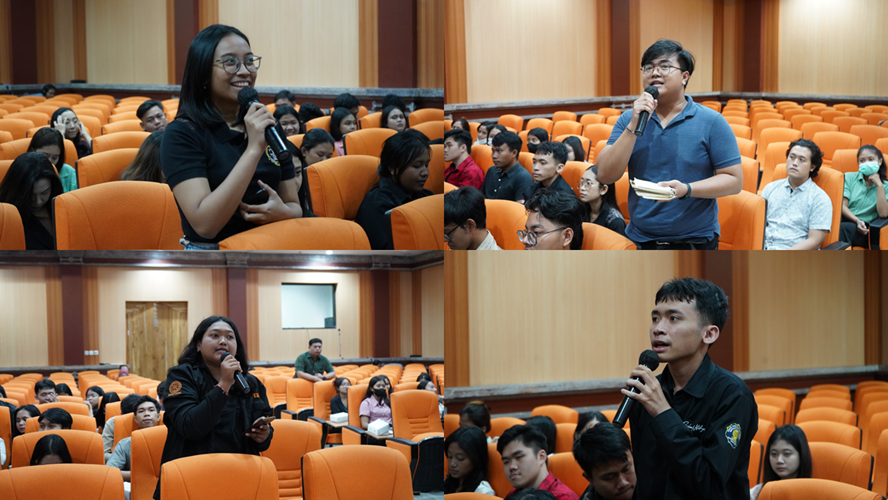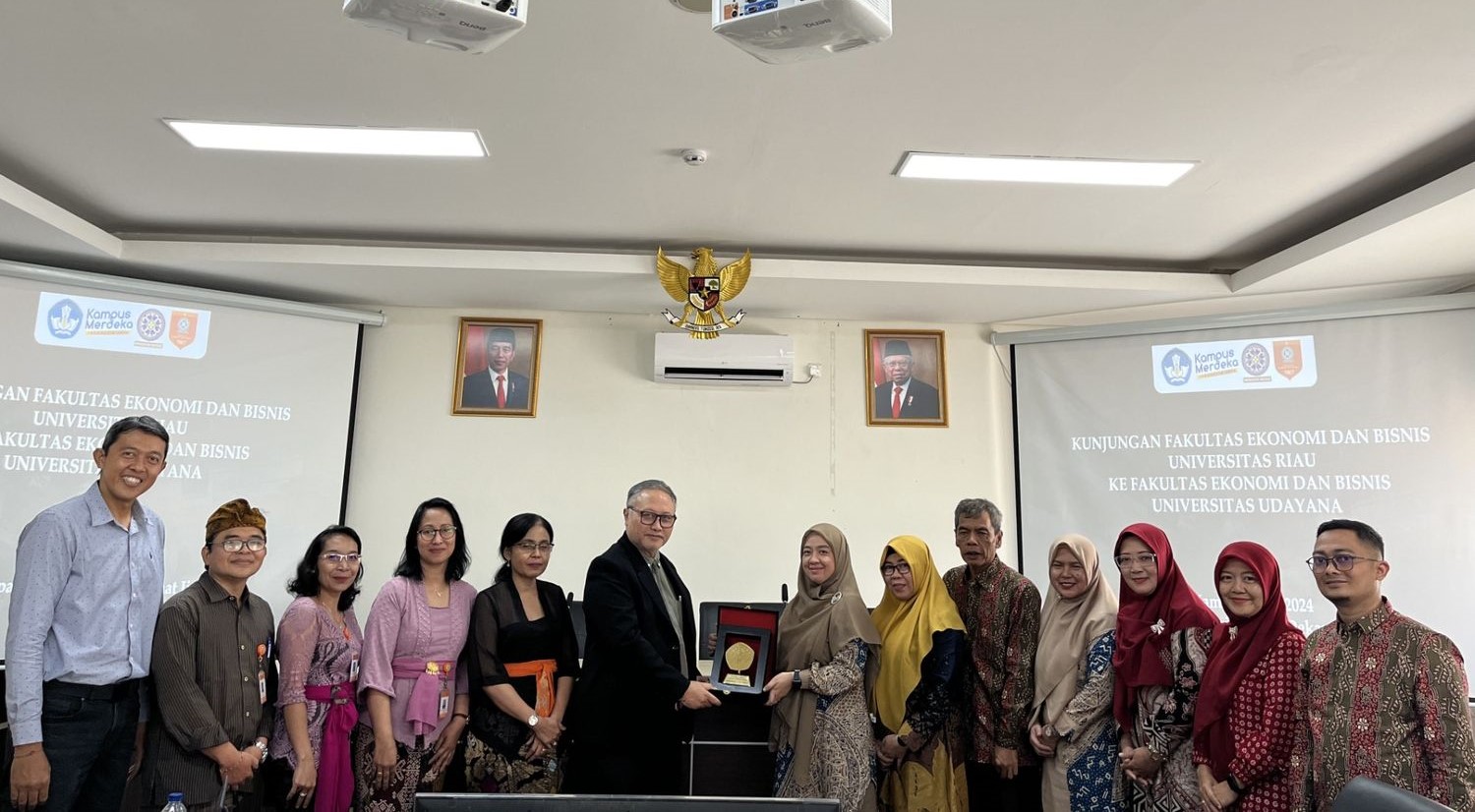FEB Unud collaborates with PPPK and DPD Bali Nusra to implement appraisal profession socialization
Denpasar, Press Bureau BEM FEB Unud, Faculty of Economics and Business, Udayana University (FEB Unud), collaborates with the Financial Professional Development Center (PPPK), which collaborates with the Regional Management of the Indonesian Appraisal Professional Society for the Bali and Nusa Tenggara region (DPD Bali Nusra) to carry out professional socialization. The assessment took place on Tuesday, March 5, 2024, in the BH Building Hall, Sudirman Campus, FEB Unud. This socialization activity aims to increase students' understanding of the appraisal profession.
This activity was attended by I Gede Nandya Oktora P.S.E., MBA., CRA., CRP., as Coordinator of the FEB Unud Information Management and Cooperation Unit, Guntur Pramudiyanto as Chair I of the National Management Board of the Indonesian Appraisal Professional Society (DPN) MAPPI), Citra Wulan Ratri , S.P., MBA., as Head of the Sub Division for Development of Appraisers, Actuaries and Other Financial Professionals, and I Gusti Ngurah Agung Haridhira, S.E., M.Ec.Dev. MAPPI (Cert.) as the Regional Manager of the Indonesian Appraisal Professional Society (DPD MAPPI) for the Bali and Nusa Tenggara regions who was also a speaker at this socialization activity, as well as representatives of FEB Unud students.
In this socialization, there were 2 material presentations. The first material discussed Getting to Know PPPK and the Public Appraiser Profession, which was presented by Citra Wulan Ratri, S.P., MBA., as Head of the Appraiser, Actuarial, and Other Financial Profession Development Sub-Section. The second material discussed the appraisal profession and the appraisal professional association presented by Gusti Ngurah Agung Haridhira, S.E., M.Ec.Dev. MAPPI (Certificate), as Regional Manager of the Indonesian Appraisal Professional Society (DPD MAPPI) for the Bali and Nusa Tenggara regions. In her presentation, Citra Wulan introduced in more detail the Financial Professional Development Center (PPPK) regarding the roles and tasks carried out. PPPK, also called P2PK, is a financial profession regulator whose role is to build public trust that the practice of the financial profession is in accordance with the code of ethics and professional standards. PPPK ensures that the professions being trained can provide professional services to the community. This is done by preparing policy formulation, training, guidance, supervision, and law enforcement. The guidance provided includes registration, licensing, and assistance with reporting and SPM. The development carried out includes development standards, PPL implementation, professional outreach, and stakeholder involvement. Administrative sanctions given can be in the form of a warning, suspension of permits, or revocation of permits. Not only that, PPPK also received several recognitions and played a role in improving service quality at national and international levels. PPPK actively contributes to improving audit quality, regulations, implementation, and professional standards with international organizations. Apart from that, Citra Wulan also discussed the profession of public appraiser in relation to the profession, the field of services provided, as well as the flow and development of the appraiser profession. A public appraiser is an appraiser who has received permission from the Minister of Finance to provide his services. The public appraisal profession has a broad field because its segments are very diverse. Becoming part of the financial profession can start with formal education, certification exams, work experience, and submitting registration to PPPK.
In his presentation, Haridhira introduced the appraiser profession in depth, including the code of ethics, appraiser standards, scope of work, history, and the role of appraisers in national development. Public appraisers are appraisers who have permission from the minister of finance. There is a business entity run by the public appraisal profession, namely the Public Appraisal Services Office (KJPP). The KJPP business entity has obtained a business license from the minister of finance as a forum for public appraisals and to carry out appraisals and other services. The Indonesian Appraiser Code of Ethics (KEPI) and the Indonesian Appraiser Standards (SPI) regulate the Indonesian appraiser code of ethics, general principles of appraisal concepts, appraisal standards, and guidelines for implementing appraisals. There is a professional appraisal organization in Indonesia known as the Indonesian Appraiser Professional Society (MAPPI). In its history, MAPPI was founded on October 20, 1981, in Jakarta. The development of the MAPPI license from 1981 to 2023 has experienced quite a significant increase. The role of appraisers in national development can be seen in various sectors, such as the financial sector, agricultural sector, taxation sector, public asset management sector, intellectual property rights sector, and private sector. The appraisal profession contains various disciplines, such as economics, engineering, business economics, computers, quantitative methods, environmental, legal, and social. He also explained the stages of becoming an appraiser and the education and empowerment levels of the Indonesian Appraiser Professional Society (MAPPI).
The socialization activity was then continued with a question-and-answer session, which was enthusiastically welcomed by the participants. On this occasion, there were six students who asked questions and succeeded in getting door prizes as active questioners. This socialization activity then closed with the presentation of mementos.
The series of implementation of the Socialization of the Appraiser Profession which has been completed brings hope to all parties regarding the benefits resulting from this event. One of these positive benefits was felt by I Gusti Ayu Mira Ananda Putri as a participant in the Appraisal Profession Socialization activity, "As a participant, I feel like I have gained new insight into the appraiser profession. In the past, I only knew about appraisers themselves from one of the official campuses and didn't really delve into it, but it turns out that the appraiser profession is really needed now and helps from both the government itself and the private sector. "With this socialization, I became interested in the appraisal profession and wanted to explore more deeply the appraisal profession itself," he said. (mrh)
Author: Kadek Ayu Mirah Ariyani.


.jpg)
FACULTY OF ECONOMICS